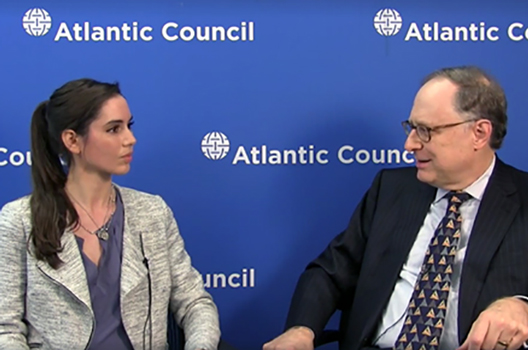 While US President Donald J. Trump admonished the United States’ NATO allies at a meeting in Brussels on May 25 for not spending enough on collective defense, it is the threat posed by Russia that has been a bigger factor in galvanizing the allies’ defense commitments, according to a former deputy secretary general of NATO.
While US President Donald J. Trump admonished the United States’ NATO allies at a meeting in Brussels on May 25 for not spending enough on collective defense, it is the threat posed by Russia that has been a bigger factor in galvanizing the allies’ defense commitments, according to a former deputy secretary general of NATO.
“Vladimir Putin probably had more of a role in increasing defense spending than Donald Trump,” said Alexander Vershbow, who now serves as a distinguished fellow with the Atlantic Council’s Brent Scowcroft Center on International Security.
Originally founded to provide collective security for Europe against the threat from the Soviet Union, NATO has seen a revival of hostility from Moscow in recent years. From an invasion of Ukraine in 2014 to perceived interference in Western democratic elections, Russia has demonstrated its disregard for the liberal rules-based world order enforced by institutions such as NATO.
“[Russia’s] military buildup, the aggressive military posture as demonstrated in these frequent snap exercises with no advance notification, and sometimes bringing more than 100,000 troops to NATO’s border with only a day’s warning time,” are sources of concern for European NATO members, Vershbow explained in a Facebook Live interview with Rachel Ansley, an editorial assistant at the Atlantic Council.
On May 25, Trump, who has in the past described NATO as “obsolete,” met for the first time with the leaders of other Alliance member states. Defense spending and other pressing concerns, such as the threat posed by international and homegrown terrorism, were discussed. In Brussels, Trump reaffirmed the United States’ commitment to counterterrorism. According to Vershbow, NATO is already involved in the fight against terrorism, but could play a greater role in the future.
While Trump’s skepticism regarding NATO has been widely criticized, Vershbow said that a sense of frustration has historically characterized US-NATO relations, due to a lack of spending on collective defense by many allies. While twenty member states have increased their budget for defense spending over the past year, twenty-three out of twenty-eight of the member states still do not meet the agreed-upon commitment to spend 2 percent of national gross domestic product (GDP) on defense.
The meeting in Brussels could serve as a turning point in the US-NATO relationship and garner real, lasting commitments from member states, said Vershbow.
Despite negative rhetoric from Trump, Vershbow was hopeful about the potential for positive outcomes from the meeting. While Trump failed to expressly endorse Article 5, the collective defense clause of the NATO charter, he said that the United States would not “forsake the friends” who came to its aid in the wake of the terrorist attacks on September 11, 2001. [Following the al Qaeda attack on the United States in 2001, NATO, for the first and only time in its history, invoked Article 5.]
In turn, Vershbow said, allies must now show that they are willing to share the burden equally, largely in terms of increasing defense spending and participating in missions.
Vershbow said the Brussels summit will not answer all the questions, but, he added, “I think that what happens next after this meeting will be more important to really bring about this full-fledged renewal of vows that we need.”
Kelly Russo is a communications intern at the Atlantic Council.
Image: Ambassador "Sandy" Vershbow (right) distinguished fellow at the Atlantic Council and former deputy secretary general of NATO, joined the Atlantic Council's Rachel Ansley (left) for a Facebook Live discussion on US President Donald Trump's meeting with fellow NATO leaders.
